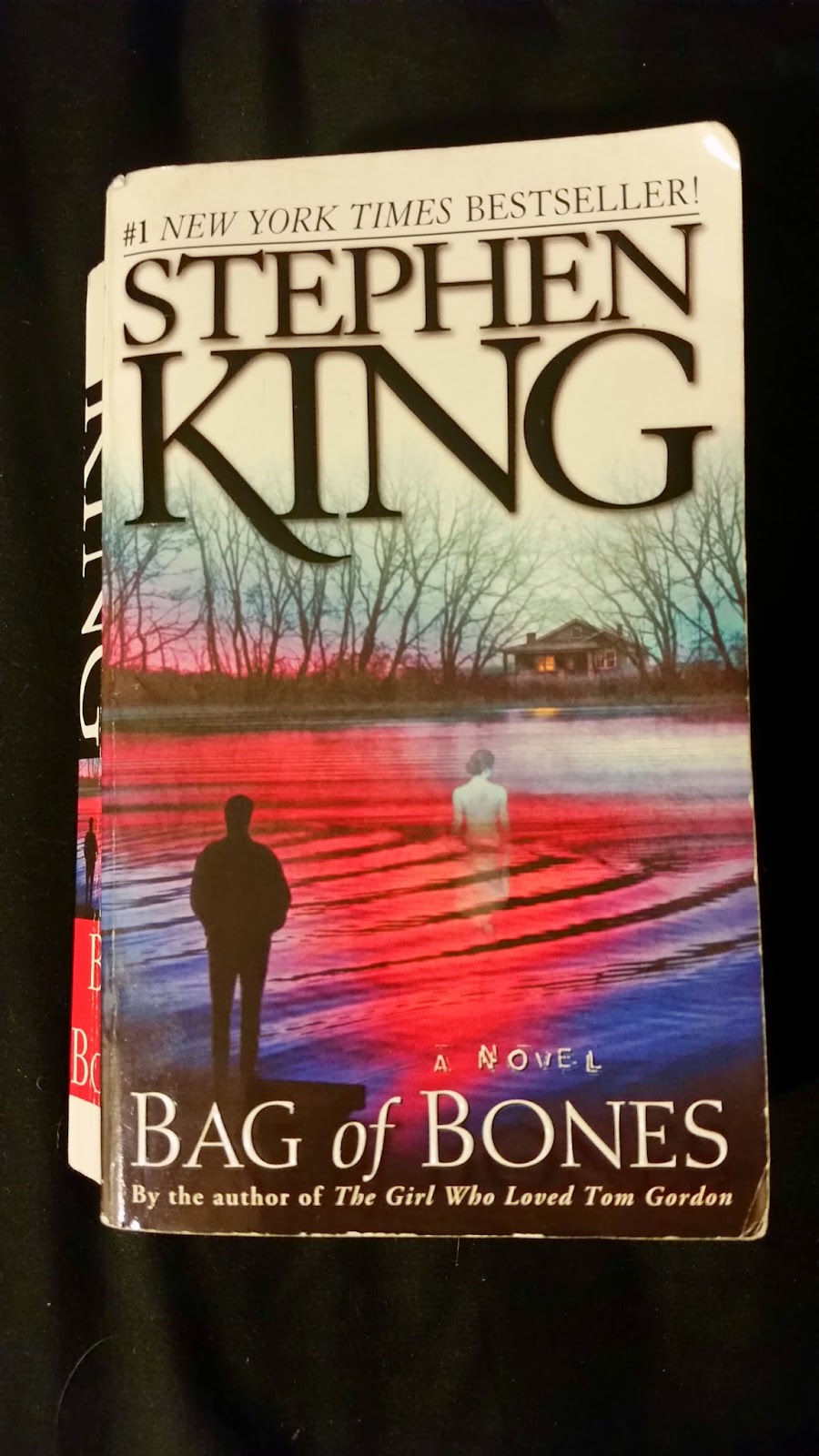by Stephen King
p. 1998
Michael Noonan is haunted.
As the tragic lead protagonist in
Stephen King’s 1998 novel, widower Mike Noonan finds him at the center of
several dangerous and emotional plots when he retreats to his summer home in an
attempt to move on with his life.
Bag
of Bones is only my second King novel, and it leans closer to the genre he
is best known for: horror and suspense. Indeed, the sprawling, multi-layered
story is in turns mysterious, disturbing, tragic and dark. It wasn’t as long as
my first King novel, but then few books are. It does, however, share some
themes that may be King trademarks, not the least of which is having a widowed
male protagonist who could be a stand-in for King himself. In this case, it is
a little more transparent: Mike Noonan is a popular author who finds himself
unable to write a single word since the unexpected death of his wife, Johanna,
some years earlier.
In an attempt to make sense of the
strange nightmares he keeps having, Mike decides to go to the location that
keeps recurring in them: his vacation house on Dark Score Lake in small town
Maine, nicknamed Sara Laughs for its notorious history with an old blues
singer, Sara Tidwell. On his first day back, Mike’s life becomes intertwined
with that of a young mother, Mattie Devore, and her 3-year-old daughter, Kyra.
Reminded of his own childless marriage and attracted to the alluring
Mattie—herself a young, tragic widow—Mike becomes embroiled in an ensuing
custody battle for Kyra, led by the girl’s paternal grandfather, a multi-millionaire
tycoon who is determined to always get what he wants.
Bag
of Bones is a long book but it needs to be; there are plenty of plot
threads, each with its own respective history, that are thoroughly explored
before all coming together at the climax of the story. This is not a gory
horror novel, as the suspense relies mainly on ghostly encounters and
nightmarish secrets, but there are some starkly disturbing elements, especially
that of the fate of Sara Tidwell and her kin and the ultimate fate of Mattie
Devore, the latter of which took me especially by surprise. I did not expect
King to kill his female lead so violently (after mercifully letting the main
couple live in The Stand), but I
guess I should have seen it coming. Mattie and Kyra were just so disgustingly precious that they couldn’t possibly be
allowed to endure past novel’s end. I mean, where would the story be in that?
Though there were no female-to-female
relationships in Bag of Bones
(outside of the mother-daughter relationship), the novel is possessed and led
by the actions of many interesting female characters: Mattie and Kyra, who
provide the immediate action for the plot; Jo, who—though long deceased—haunts
Sara Laughs and guides Mike on his spiritual journey to the truth; Sara
Tidwell, whose fate began a curse culminating in the final showdown of the
present, and Sara Laughs—the house who is herself like a living, breathing
character. Even Max Devore’s spindly, prickly assistant, Rogette Whitmore, is a
dynamic if villainous character who brings life to the novel, even if she is,
at times, a bit over the top. I only wish that Mattie didn’t present as such a
disposable character. Arguably the female lead, she should have presented as a
stronger character, but she relied heavily on others to save her, and felt like
more of a temptation and a complication for Mike than an individual. I have to
admit I was a little grossed out by his fantasizing about this girl half his
age, and it gets weirder when you realize that Mattie was really only a means
of Mike getting what he always wanted (his own child), before being
conveniently disposed of. Perhaps that last part is an oversimplification, perhaps
not. The story is about the haunting of Mike Noonan, after all, everyone else
is necessarily secondary to the story.
I didn’t enjoy this story as much
as The Stand; even though it was
somewhat shorter, I feel it dragged on at times, or took too long to get to the
action, but these were minor points of contention for me. For the most part, I
like slow-boiling plots and character-driven stories, as long as they are
presented with a modicum of poetry and poise, and Stephen King is wonderful at
demonstrating those. It mostly comes down to my genre preferences: The Stand is a post-apocalyptic story,
one of my favorite genres, while Bag of
Bones, a horror novel, is a genre I’m less likely to be invested in. The
fact is, horror stories, to someone as pragmatic as I typically am, require
much more suspension of disbelief. If Bag
of Bones had culminated in a psychological and wholly realistic finale as
opposed to a mystical one, I might have a different opinion altogether.

No comments:
Post a Comment